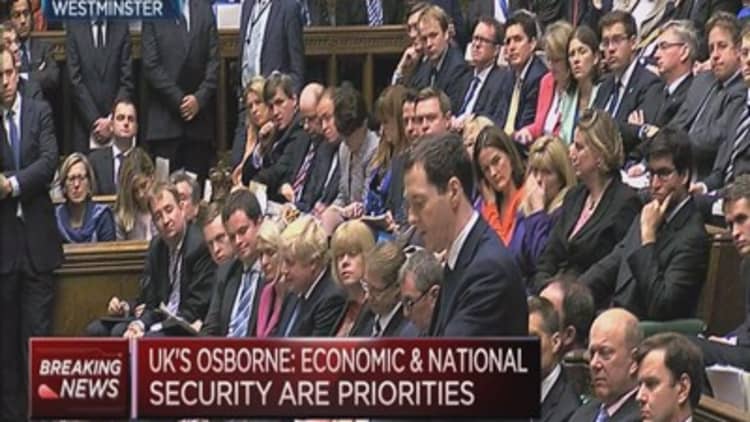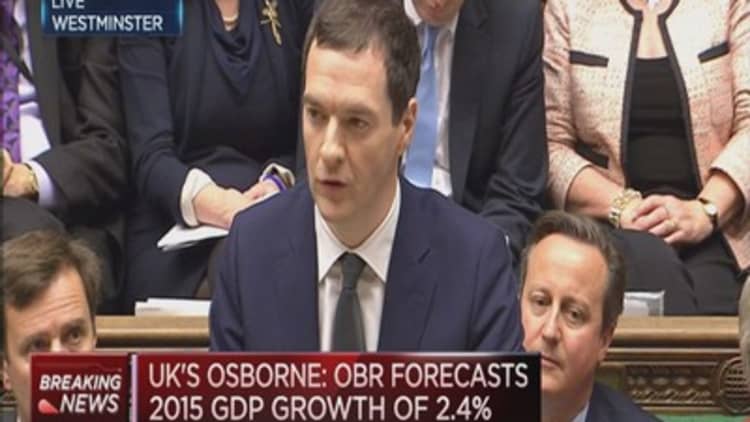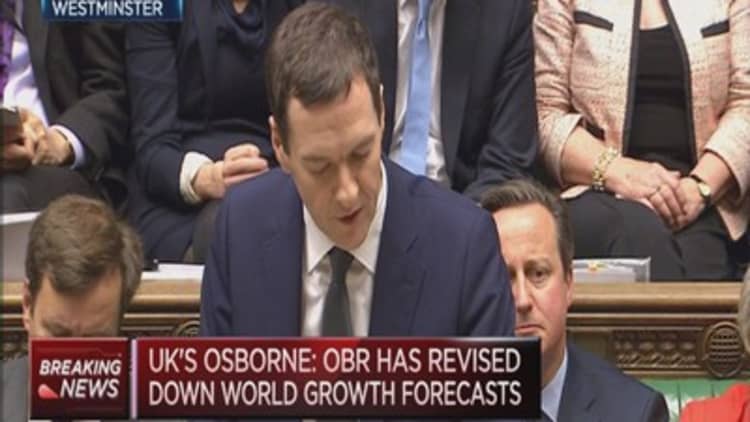The U.K. government will put "security first," the Chancellor of the Exchequer said in his Autumn Statement and Spending Review in Westminster on Wednesday.
"Our job is to rebuild Britain… so that Britain becomes the most prosperous and secure of all the major nations in the world," he told parliament in a televised speech.

This year, the Autumn Statement and the Spending Review are combined. The spending review sets out how the government will spend the £4 trillion ($6 trillion) of taxpayers' money at its disposal. The Statement is one of the government's biannual updates to its plans for the economy.
Osborne said the government would protect the U.K.'s "economic security by taking the difficult decision to live within our means" and that national security would be protected by "defending out interests abroad."
His speech comes as Europe remains in shock following the Paris terror attacks on November 13 that killed 130 people.
One change announced by Osborne, who is a contender to be the U.K.'s next prime minister, was increased funding for the BBC World Service. That's so "British values... are heard around the world."
He added that the 0.7 percent of national income that is spent on international development would be "reorientated to help those in fragile and failing states on Europe's borders."
"It is overwhelmingly in Europe's interest that we do that," Osborne said.
And in a surprise move, Osborne said there would be no cuts to the police budget.
"The police protect us and we are going to protect them," he said, in a pronouncement that was greeted with cheers.
Welfare cut plans scrapped
In a notable u-turn, Osborne scrapped his plan to cut state support for low-paid workers.
This comes after his proposal to reduce the payment of "tax credits" to workers was rejected by Britain's upper house of parliament, the House of Lords, in October.
David Owen, chief European financial economist at Jefferies, said the turnaround was "obviously a politically inspired move."
"At the end of the day, they have still got to come up with cuts," he told CNBC after Osborne spoke.

Osborne said that the U.K. economy was still forecast to grow by 2.4 percent this year, as it was in July.
The Office for Budget Responsibility upgraded its forecast for 2016 growth to 2.4 percent, from the 2.3 percent predicted in July.
Growth is seen peaking at 2.5 percent in 2017, before falling slightly to 2.4 percent in 2018 and 2.3 percent in both 2019 and 2020.
£12B in welfare cuts
The chancellor said that £12 billion of previously promised savings on welfare spending would be "delivered in full."
He added that housing benefits provided for social sector accommodation would be capped.
The chancellor also announced cuts to the core budget of the cabinet office and Treasury over the next four years. Tax offices around the country are set to shut.
"To simply argue that public spending must always go up… is simply irresponsible," he said.
Other cuts include the replacement of "unaffordable" student maintenance grants with loans.
Osborne said that his four-year plan meant the country would deliver a budget surplus by the tax year 2019/2020.
"That is a major surprise... we'll have to look at the numbers and see how they add up," Jefferies told CNBC after Osborne spoke.
In 2015/2016, the budget deficit is seen at 3.9 percent of the U.K. economy.
Housing budget doubles
The shortage of housing, particularly in London, is a controversial topic in the U.K., as is the prohibitive of cost of buying a first house.
On Wednesday, the chancellor said that he would double the housing budget to £2 billion a year and release public land suitable for 160,000 houses to be built.
In addition, Londoners will be able to get interest-free loans to help them buy newly built houses.
A new higher rate of "stamp duty"— a tax imposed when you buy property over a certain price in England, Wales and Northern Ireland — will be imposed for buy-to-let homes and second homes. This helps combat complaints that typically wealthier buyers are distorting the housing market, forcing up prices.
Michael Wistow, head of tax at Berwin Leighton Paisner, was unimpressed by the "stamp duty" move.
"To solve the housing crisis, the UK needs more houses to buy and more houses to rent.
"Increasing stamp duty on certain classes of investors in buy-to-let is distortive and appears counter-intuitive and will only restrict supply," he said in a statement emailed to CNBC after Osborne spoke.
£6B boost for NHS by 2016

Osborne announced a £6 billion cash injection in 2016 for the country's state-funded healthcare system, called the National Health Service (NHS).
Areas to get a spending boost include dementia and mental health, including increased provision for "talking therapies," "crisis" care and postnatal mental health.
He reiterated the government's commitment to a "seven-day-a-week NHS." This has proved highly controversial among doctors, due to planned changes to their pay aimed at making the commitment more affordable.
As a result, junior doctors in the country are set for their first "all-out" strike next month, which will put huge stress on the health service at a very time of year for hospital admissions.
Markets react... but not that much
The benchmark FTSE 100 index rose slightly as Osborne spoke, to trade just under 1 percent higher at a session high.
Sterling rose against the euro and the U.S. dollar before paring some gains.
— By CNBC's Katy Barnato. Follow her on Twitter @KatyBarnato.



